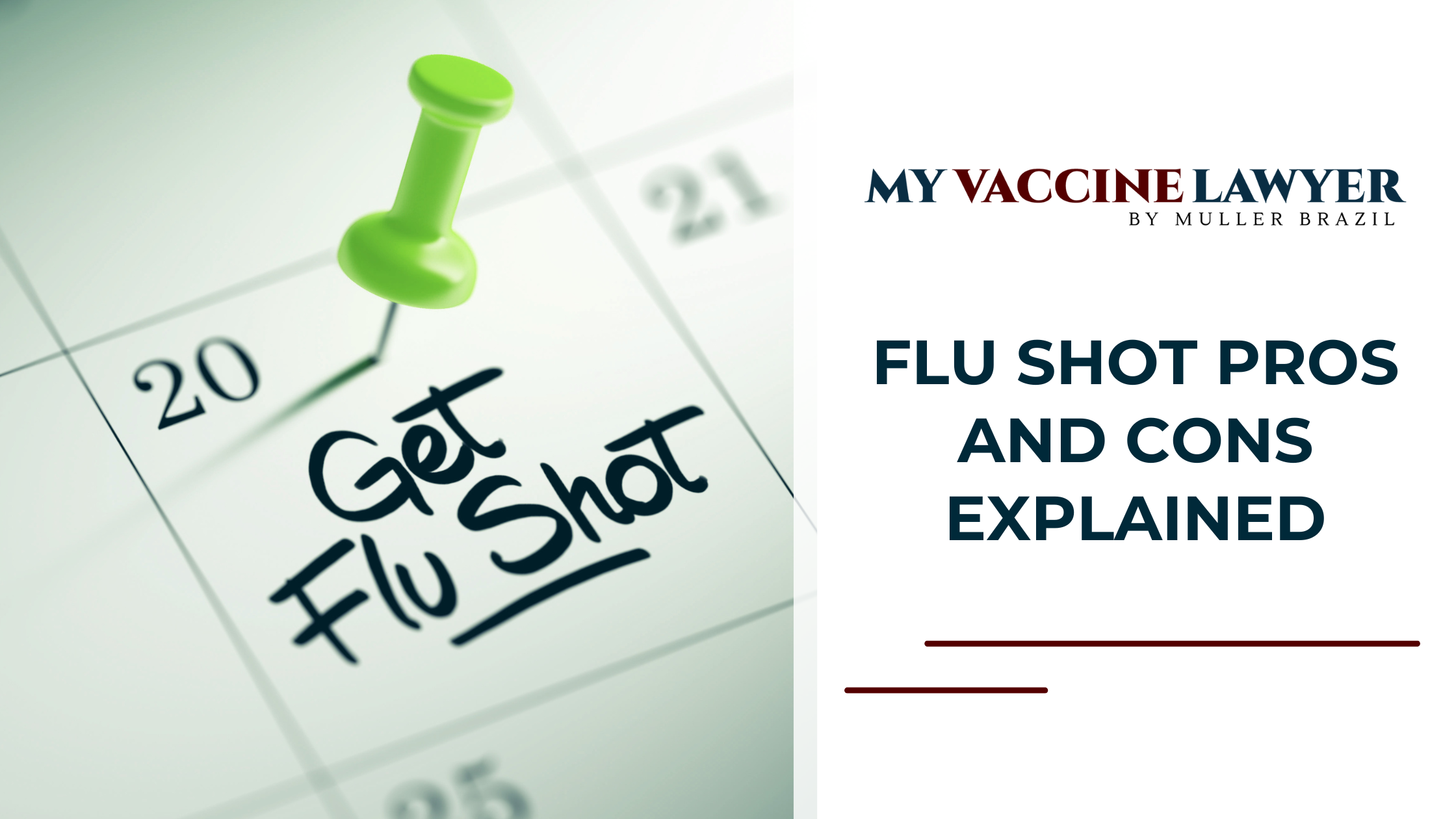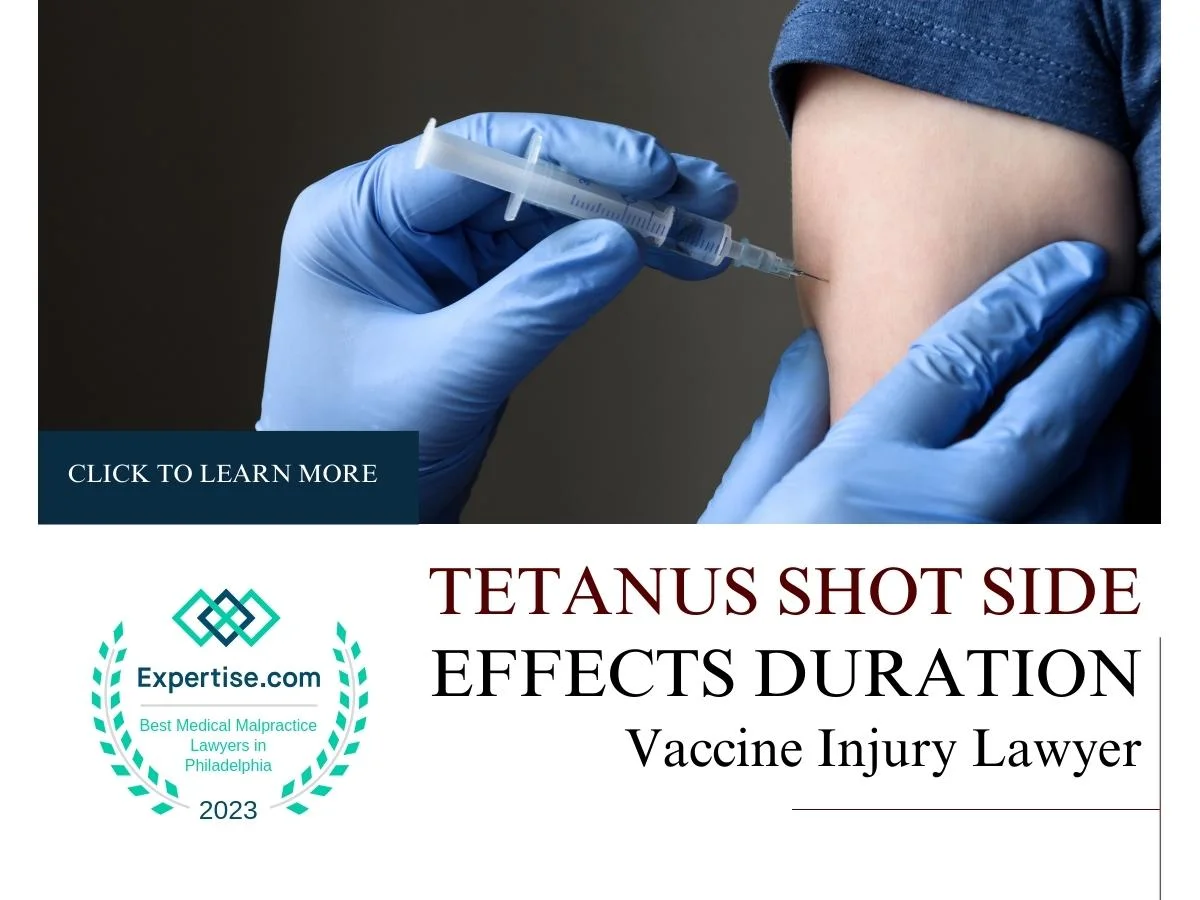SIRVA Exercises: Easing Shoulder Pain After Vaccination
If you experience shoulder pain after a vaccination, you might have a Shoulder Injury Related to Vaccine Administration (SIRVA). Exercises like the...
8 min read
Vaccine Injury Law Resources / Tetanus Shot / Duration of Tetanus Shot Side Effects in Adults
 Paul Brazil
:
May 3, 2023 8:24:39 AM
Paul Brazil
:
May 3, 2023 8:24:39 AM
If you want to know how long tetanus shot side effects last in adults here is some information for you. The side effects usually last 1 to 2 days and include soreness, redness, swelling, mild fever, and fatigue. Rarely, more serious side effects like SIRVA (shoulder injury related to vaccine administration) and brachial neuritis can occur, causing long-term pain and weakness. If you have prolonged symptoms, seek medical advice and consider contacting a vaccine injury attorney for potential compensation through the Vaccine Injury Compensation Program (VICP).
While some individuals only receive tetanus shots after being bitten by an animal or stepping on a rusty nail, millions of Americans get vaccinated yearly. Although most recipients only experience mild side effects, such as arm soreness or headaches, serious side effects like SIRVA (shoulder injury related to vaccine administration) or brachial neuritis may occur in rare cases. These conditions can take months or even years to recover from fully. However, fortunately, the Vaccine Injury Compensation Program (VICP) offers financial compensation to those affected by these vaccine injuries.
If you or a loved one has experienced prolonged arm pain or other adverse reactions following a tetanus shot, our team of experienced vaccine injury attorneys can assist you in seeking the compensation you deserve. Please contact us to schedule a free consultation and learn more about the tetanus vaccine side effects, SIRVA, brachial neuritis, and VICP.
Tetanus shot side effects in adults typically last 1 to 2 days. Common side effects include soreness, redness, or swelling at the injection site, mild fever, and fatigue. Severe side effects are rare but if symptoms persist or worsen, it is advisable to consult a healthcare provider for guidance. The tetanus vaccine is generally considered safe and effective at preventing tetanus infections, which can be serious or life-threatening.
In rare cases, more serious side effects may occur. These can include allergic reactions, such as difficulty breathing or swelling of the face, throat, or tongue, and may require immediate medical attention. Other rare side effects of the tetanus vaccine include SIRVA (shoulder injury related to vaccine administration) and brachial neuritis, which affect the nerves in the arm and can cause long-lasting pain, weakness, or paralysis.
It's important to note that the risk of serious side effects from the tetanus vaccine is extremely low compared to the risk of developing tetanus without vaccination. If you have concerns about the tetanus vaccine or its potential side effects, you should discuss them with your healthcare provider. They can help you decide whether or not to get vaccinated and address any questions or concerns.
Common side effects of the tetanus vaccine include:
Soreness, redness, or swelling at the injection site:
It's normal to experience some tenderness or soreness at the injection site after receiving the tetanus vaccine. Redness and swelling may also occur. These side effects usually begin within a few hours of vaccination and can last a few days.
Mild fever:
A mild fever is another common side effect of the tetanus vaccine. This can occur within the first few days after vaccination and is usually not a cause for concern.
Headache:
Headaches are also a possible side effect of the tetanus vaccine. This can occur within the first few days after vaccination and can range from mild to moderate in severity.
Fatigue:
Fatigue or feeling tired is another common side effect of the tetanus vaccine. This can occur within the first few days after vaccination and may last a few days.
Nausea:
Some people may experience mild nausea or a queasy feeling after getting vaccinated. This can occur within the first few days after vaccination.
Body aches:
Body aches or muscle pain are also possible side effects of the tetanus vaccine. This can occur within the first few days after vaccination and may last a few days.
Moderate side effects of the tetanus vaccine are less common than mild side effects but can still occur. These may include:
Fever over 102.2°F (39°C):
While a mild fever is a common side effect of the tetanus vaccine, a fever over 102.2°F (39°C) is considered a moderate side effect. This can happen within the first few days after vaccination and could last a few days.
Swollen glands in the neck, armpit, or groin:
Swollen glands in the neck, armpit, or groin are another possible moderate side effect of the tetanus vaccine. You may experience this within a few days of getting vaccinated and it may continue for some days.
Joint pain or stiffness:
Joint pain or stiffness can be a moderate side effect of the tetanus vaccine. This can occur within the first few days after vaccination and may last a few days.
Flu-like symptoms such as chills, fatigue, and headache:
Some people may experience flu-like symptoms such as chills, fatigue, and headaches after vaccination. These symptoms can occur within the first few days after vaccination and may last a few days.
Numbness or tingling in the hands or feet:
Numbness or tingling in the hands or feet is another possible moderate side effect of the tetanus vaccine. You may experience this condition for a few days shortly after getting vaccinated.
If you experience any moderate side effects after receiving the tetanus vaccine, it's important to contact your healthcare provider. They can guide managing your symptoms and may recommend additional medical care.
Serious side effects from the tetanus vaccine are rare but can occur. These may include:
Severe allergic reaction (anaphylaxis):
Anaphylaxis is a life-threatening reaction that can cause symptoms such as hives, difficulty breathing, and rapid heartbeat. This reaction can happen within minutes or hours of receiving the vaccine. While extremely rare, severe allergic reactions can occur after receiving the tetanus vaccine.
Shoulder injury related to vaccine administration (SIRVA):
SIRVA is a condition that can occur when a vaccine is improperly administered, causing injury to the shoulder. This condition is typically diagnosed within a few days to weeks after vaccination. Symptoms can include pain, stiffness, and limited range of motion in the affected arm. Treatment may include physical therapy or corticosteroid injections. In some cases, surgery may be required.
Brachial neuritis:
Brachial neuritis is a rare condition that can occur after vaccination. It is characterized by sudden, severe shoulder pain, weakness, and numbness in the affected arm. This condition can develop within a few days to weeks after vaccination. Recovery can take several months or even years; some patients may experience long-term effects. Treatment may include pain management, physical therapy, or surgery in severe cases.
Shoulder injury related to vaccine administration (SIRVA) is a specific type of injury that can occur after receiving a TDaP shot or any vaccine injected into the shoulder muscle. This injury happens when the vaccine is injected too high or too deep into the shoulder, causing damage to the surrounding structures, such as the tendons, ligaments, or nerves. Symptoms of SIRVA can include pain, stiffness, limited range of motion, and weakness in the affected arm.
SIRVA can be a serious and long-lasting condition that can significantly impact a person's daily life. In severe cases, it can also require costly medical treatment, including physical therapy, corticosteroid injections, or surgery. In some cases, SIRVA can lead to permanent disability.
If you suspect you have SIRVA after receiving a TDaP shot, it's important to seek medical attention immediately. Your healthcare provider can diagnose SIRVA through a physical examination and imaging tests, such as an ultrasound or MRI. If you are diagnosed with SIRVA, you may be eligible for compensation through the Vaccine Injury Compensation Program (VICP).
If you have been diagnosed with a shoulder injury related to vaccine administration (SIRVA), your healthcare provider may recommend several treatment options to alleviate your symptoms and help you recover. The specific treatment approach will depend on the severity of your SIRVA injury and the specific structures that have been affected.
In mild cases of SIRVA, your healthcare provider may recommend over-the-counter pain relievers, such as ibuprofen or acetaminophen, and rest. They may also suggest physical therapy exercises to help restore the range of motion and strengthen the muscles and tendons surrounding the affected area.
In more severe cases of SIRVA, your healthcare provider may recommend corticosteroid injections or a referral to a specialist for further evaluation and treatment. In rare cases, surgery may be necessary to repair the damaged structures in your shoulder.
Following your healthcare provider's recommendations and attending all scheduled appointments to monitor your recovery progress is crucial. Be sure to inform your healthcare provider of any new or worsening symptoms and any side effects you may experience from the prescribed treatments.
If you have been diagnosed with SIRVA after receiving a TDaP shot, you may be eligible for compensation through the Vaccine Injury Compensation Program (VICP).
Brachial neuritis, also known as Parsonage-Turner Syndrome (PTS), is a rare neurological condition that can occur after receiving a tetanus shot or any vaccine that triggers an immune response. PTS happens when the body's immune system mistakenly attacks the nerves in the brachial plexus, a network of nerves that controls movement and sensation in the shoulders, arms, and hands.
The symptoms of PTS can include severe pain, weakness, and numbness in the affected arm or shoulder. Sometimes, the pain can be so severe that it requires hospitalization. The weakness and numbness can also lead to difficulty performing everyday tasks, such as dressing, bathing, and eating.
PTS can be a debilitating condition that can take months or even years to recover fully. Treatment options for PTS typically focus on managing symptoms and preventing complications, such as muscle atrophy or contractures.
If you have been diagnosed with PTS after receiving a tetanus shot, you may be eligible for compensation through the Vaccine Injury Compensation Program (VICP). It's important to speak with an experienced vaccine injury attorney to understand your legal rights and options for filing a claim with the VICP.
Q: What is the tetanus shot, and why is it necessary?
A: The tetanus shot, also known as the Tdap vaccine, is a vaccine that helps prevent infection with tetanus bacteria. Tetanus bacteria are commonly found in soil, dust, and manure. They can enter the body through cuts, scrapes, or puncture wounds. The vaccine is necessary to protect against the potentially deadly effects of tetanus, including severe muscle stiffness and spasms.
Q: What are the common side effects of the tetanus shot?
A: Common side effects of the tetanus shot include pain, redness, swelling at the injection site, fever, headache, and fatigue. These side effects typically last only a few days and are generally mild.
Q: What are the moderate side effects of the tetanus shot?
A: Moderate side effects of the tetanus shot can include prolonged swelling or redness at the injection site, high fever, and body aches. These side effects can last several days and may require medical attention.
Q: What are the serious side effects of the tetanus shot?
A: Serious side effects of the tetanus shot are rare but can include severe allergic reactions, such as anaphylaxis, and shoulder injuries related to vaccine administration (SIRVA) or brachial neuritis (Parsonage-Turner Syndrome). These conditions can cause long-term pain, weakness, and disability and may require extensive medical treatment.
Q: What is SIRVA?
A: SIRVA stands for shoulder injury related to vaccine administration. It is rare when a vaccine is improperly administered to the shoulder joint, causing inflammation and damage to the surrounding tissues. Symptoms of SIRVA include severe pain, limited range of motion, and weakness in the affected arm.
Q: What is brachial neuritis?
A: Brachial neuritis, also known as Parsonage-Turner Syndrome (PTS), is a rare neurological condition that can occur after receiving a tetanus shot or any vaccine that triggers an immune response. PTS happens when the body's immune system mistakenly attacks the nerves in the brachial plexus, a network of nerves that controls movement and sensation in the shoulders, arms, and hands. Symptoms of brachial neuritis include severe pain, weakness, and numbness in the affected arm or shoulder.
Q: Can I file a claim for compensation if I experience a vaccine injury?
A: If you experience a vaccine injury, you may be eligible for compensation through the Vaccine Injury Compensation Program (VICP). The VICP is a federal program that provides financial compensation to individuals who experience certain adverse reactions to vaccines. It's important to speak with an experienced vaccine injury attorney to understand your legal rights and options for filing a claim with the VICP.
If you or a loved one is experiencing prolonged arm pain or other serious side effects after receiving a tetanus shot, our team of experienced vaccine injury lawyers is here to help. We understand how overwhelming it can be to deal with a vaccine injury's physical, emotional, and financial consequences.
Our lawyers are dedicated to fighting for the rights of individuals injured by vaccines. We have the knowledge and resources to help you navigate the complex legal process of filing a vaccine injury claim.
We offer free consultations to discuss your case and determine your eligibility for compensation through the National Vaccine Injury Compensation Program (VICP).
Don't suffer in silence with a vaccine injury. Contact us today to schedule a free consultation with one of our vaccine injury lawyers.
Paul Brazil is a native of Dunmore, Pennsylvania and a graduate of Dunmore High School. For his undergraduate education, he attended Bloomsburg University where he majored in political science. He then went on to earn his JD from Widener University School of Law. Following graduation from law school, Mr. Brazil worked at a large Philadelphia civil defense firm where he litigated workers’ compensation claims and Heart and Lung Act cases. In 2012, he joined with his coworker Max Muller to form Muller Brazil.

If you experience shoulder pain after a vaccination, you might have a Shoulder Injury Related to Vaccine Administration (SIRVA). Exercises like the...

While mild soreness is expected after a vaccine, persistent arm numbness may indicate nerve irritation or an immune reaction.

The flu shot helps prevent severe illness and hospitalizations, but some people may experience mild side effects or rare complications, making an...
